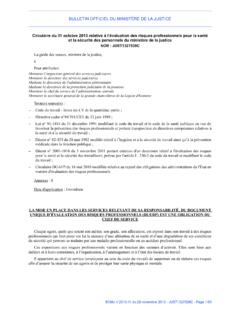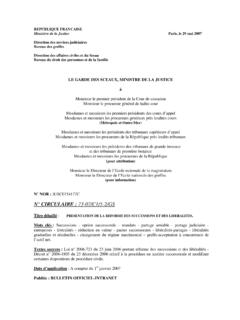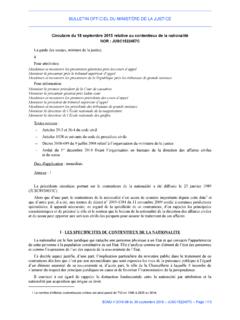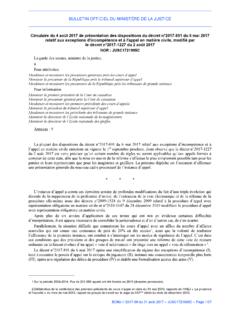Transcription of bTHE LAW OF CONTRACT translation by J. …
1 THE LAW OF CONTRACT , THE GENERAL REGIME OF OBLIGATIONS, AND PROOF OF OBLIGATIONS The new provisions of the Code civil created by Ordonnance n 2016-131 of 10 February 2016 translated into English by John Cartwright Professor of the Law of CONTRACT and Director of the Institute of European and Comparative Law, University of Oxford, and Tutor in Law, Christ Church, Oxford; Professor of Anglo-American Private Law, University of Leiden B n dicte Fauvarque-Cosson Professeur l Universit Panth on-Assas (Paris II) and Simon Whittaker Professor of European Comparative Law, University of Oxford and Fellow and Tutor in Law, St.
2 John s College, Oxford. This translation was commissioned by the Direction des affaires civiles et du sceau, Minist re de la Justice, R publique fran aise. The translation of the text is supplemented by notes written by the translators. TITLE III THE SOURCES OF OBLIGATIONS Art. 1100. Obligations arise from juridical acts, juridically significant facts1 or from the sole authority of legislation. They can arise from the voluntary performance or from the promise of performance of a moral duty towards another person. Art. 1100-1. Juridical acts are manifestations of will intended to produce legal effects.
3 They may be based on agreement or unilateral. As far as is appropriate, they are subject, both as to their validity and as to their effects, to the rules governing contracts. 1 There is a difficulty in translating le fait as sometimes it refers to a person s action and sometimes more broadly to fact. We have therefore translated it differently according to context. 2 art . 1100-2. Juridically significant facts consist of behaviour or events to which legislation attaches legal consequences. Obligations which arise from a juridically significant fact are governed, according to the circumstances, by the sub-title relating to extra-contractual liability or the sub-title relating to other sources of obligations.
4 SUB-TITLE I CONTRACT CHAPTER I INTRODUCTORY PROVISIONS Art. 1101. A CONTRACT is a concordance of wills of two or more persons intended to create, modify, transfer or extinguish obligations. Art. 1102. Everyone is free to CONTRACT or not to CONTRACT , to choose the person with whom to CONTRACT , and to determine the content and form of the CONTRACT , within the limits imposed by legislation. Contractual freedom does not allow derogation from rules which are an expression of public policy. Art 1103. Contracts which are lawfully formed have the binding force of legislation for those who have made them.
5 Art. 1104. Contracts must be negotiated, formed and performed in good faith. This provision is a matter of public policy. Art. 1105. Whether or not they have their own denomination, contracts are subject to general rules, which are the subject of this sub-title. Rules particular to certain contracts are laid down in the provisions special to each of these contracts. The general rules are applied subject to these particular rules. Art. 1106. A CONTRACT is synallagmatic where the parties undertake reciprocal obligations in favour of each other. It is unilateral where one or more persons undertake obligations in favour of one or more others without there being any reciprocal obligation on the part of the latter.
6 3 Art. 1107. A CONTRACT is onerous where each of the parties receives a benefit from the other in return for what he2 provides. It is gratuitous where one of the parties provides a benefit to the other without expecting or receiving anything in return. Art. 1108. A CONTRACT is commutative where each of the parties undertakes to provide a benefit to the other which is regarded as the equivalent of what he receives. It is aleatory where the parties agree that the effects of the CONTRACT both as regards its resulting benefits and losses shall depend on an uncertain event. Art. 1109. A CONTRACT is consensual where it is formed by the mere exchange of consents, in whatever way they may be expressed.
7 A CONTRACT is solemn3 where its validity is subject to form prescribed by legislation. A CONTRACT is real where its formation is subject to the delivery of a thing. Art. 1110. A bespoke contract4 is one whose stipulations are freely negotiated by the parties. A standard form contract5 is one whose general conditions are determined in advance by one of the parties without negotiation. Art. 1111. A framework CONTRACT is an agreement by which the parties agree the general characteristics of their future contractual relations. Implementation contracts determine the modalities of performance under a framework CONTRACT .
8 Art. 1111-1. A CONTRACT of instantaneous performance is one whose obligations can be performed as a single act of A CONTRACT of successive performance is one of which the obligations of at least one of the parties are performed in a number of acts of performance over a period of time. 2 General note. The French uses she (elle) in this context because of the reference to la partie. Throughout the translation we follow the convention of English statutory drafting and use the masculine singular personal and possessive pronoun (which are to be read as referring equally to the feminine or neuter) rather than using he/she , his/her etc.
9 , or some form of circumlocution. 3 Here, solemn refers to a particular class of contracts where formality is required, les contrats solennels : see below, arts 1172 1173. 4 Bespoke CONTRACT translates contrat de gr gr , which has the sense of a CONTRACT in which the parties come together in an amicable agreement. 5 Standard form CONTRACT translates contrat d adh sion, more literally a CONTRACT to which one adheres and whose conclusion therefore involves no or little choice. 6 Act of performance translates prestation in all cases except in the composite phrase prestation de services , which is translated as supply of services.
10 See also note 10 to art. 1127-1. 4 CHAPTER II FORMATION OF CONTRACTS SECTION I Conclusion of Contracts Sub-section 1 Negotiations Art. 1112. The commencement, continuation and breaking-off of precontractual negotiations are free from control. They must mandatorily satisfy the requirements of good faith. In case of fault committed during the negotiations, the reparation of the resulting loss is not calculated so as to compensate the loss of benefits which were expected from the CONTRACT that was not concluded. Art. 1112-1. The party who knows information which is of decisive importance for the consent of the other, must inform him of it where the latter legitimately does not know the information or relies on the contracting party.

















